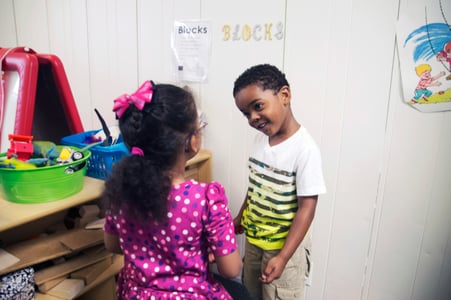
In this day and age, the likelihood of finding an opinion or theory that everyone agrees on seems impossible. The world of early education is no different. Though most educators and parents agree that Pre-K serves as the foundation for increasing the likelihood of a child’s success later in life, there is still dissent surrounding how Pre-K programs should be managed to maximize this success.
What is the role of Pre-K?
As economic and social pressures mount, it has become common for parents and teachers to request Pre-K programs that focus on early literacy and quantitative reasoning skills to enhance students’ perceived school-readiness for kindergarten. This seems reasonable since better grades in school often equate to better job and higher education opportunities later in life, right?
Not quite, according to a recent article and report published by Katharine Stevens, a research fellow at the American Enterprise Institute, suggesting that focusing solely on increasing academic marks in kindergarten may be misleading. She points out that many studies have found little support for the hypothesis that academic test scores in kindergarten are indicative of student well-being and success in school and later in life. Rather, studies have found that advanced social-emotional skills in kindergarten are significantly more correlated to positive outcomes later in life.
For example, a 2016 study conducted in Baltimore with 9,000 incoming kindergarteners found that more than half of students were coming into school with underdeveloped social-emotional skills. In other words, over 50% of students struggled to listen to others, comply with rules, manage emotions, resolve peer problems, organize and complete tasks, and cooperate with others.
Unfortunately, children who struggle with social-emotional regulation in kindergarten often find this problem compounding on itself. By fourth grade, children who entered kindergarten with low social-emotional skills were 80% more likely to be held back a grade and 7 times more likely to have been suspended or expelled at least once in the previous 5 years. In contrast, with the support of dedicated teachers, incoming kindergarten students who initially show lower literacy and mathematical development are often able to catch up to their peers.
Why aren’t kids with below average social-emotional skills catching up in school?
This is a tricky question. It seems strange that students can catch up academically but still lag in social-emotional development. Research shows that this disconnect is likely due to the complexities of human development. Scientists confirm that the age range of birth-five is defined by prolific brain development. Though each infant is born with roughly the same number of brain cells that he or she will have in adulthood, the neural connections between those brain cells are vastly underdeveloped. It is the experiences and interactions that a child has during this critical period that stimulates growth and connection between neurons. More specifically, it is the connection between child and caregiver(s) that help children learn how to manage their social-emotional skills.
In simple terms, this is basically the monkey see, monkey do phenomenon. Children grow to mirror their caregivers’ behavior and learn to perceive the world based on whether they can trust their caregivers to meet their needs. The neural pathways that manage this learned social-emotional behavior are time-sensitive and become much more inflexible after the age of five, when most children have already started kindergarten. Unlike social-emotional skills, it has been demonstrated that children still have a profound ability for cognitive (academic) growth after age five.
How can we ensure that our students are ready to succeed?
I’m glad you asked! The good news is that high quality Pre-K and early childhood development programs can enhance student social-emotional skills. A recent report published by Workforce of Today, Workforce of Tomorrow and also authored by Stevens explains that high quality childcare is not analogous to “academic” childcare, although these features may also occur. Instead the report finds that high quality childcare is “interaction driven rather than content driven,” meaning that healthy cognitive, social-emotional, and language development occurs through warm and responsive engagement from dependable caregivers.
Does that statement sound familiar? It should. From its inception, the CLASS® tool has been an integrative and holistic approach that focuses on the importance of teacher-student interactions that promote positive academic and social-emotional outcomes for children. The CLASS framework achieves this by measuring interactions around specific domains of quality. In Pre-K classrooms, the CLASS specifies emotional support as an area of quality along with instructional support and classroom organization.
This is unique to CLASS. By operationalizing these different domains of student-teacher interaction, CLASS offers a concrete and scientifically proven way to identify successful student-teacher interactions. CLASS also offers effective professional development to teachers that are struggling in these areas. Whether you are of the belief that Pre-K should be strictly academic or mostly play-based, research shows that teacher-child interactions are paramount. The CLASS provides a vocabulary and a method for educators and early childhood professionals across the spectrum of theories—from play-based to a more formal instructional approach—to talk about and understand their different perspectives of the focus of early childhood education.
An investment in the CLASS perspective and framework is an investment in children’s futures. Returning to the Stevens article, by age 25 individuals who had ranked in the lower quadrant of social-emotional skills in kindergarten were four times less likely to obtain a college degree and were much more likely to have been arrested or on the waiting list for public housing than students who ranked in the top quadrant. This further illustrates that learning the ABCs of social-emotional development is just as critical to students, if not more, than learning the ABCs of literature.
 Emma Granowsky is a research and public policy intern at Teachstone this summer. She is a rising senior at Davidson Collegeand is majoring in public health. She is interested in social disparities and the use of education policy as a form of primary health prevention. Last summer she taught reading to 3rd-5th graders through the Freedom School program sponsored by the Children’s Defence Fund.
Emma Granowsky is a research and public policy intern at Teachstone this summer. She is a rising senior at Davidson Collegeand is majoring in public health. She is interested in social disparities and the use of education policy as a form of primary health prevention. Last summer she taught reading to 3rd-5th graders through the Freedom School program sponsored by the Children’s Defence Fund.

